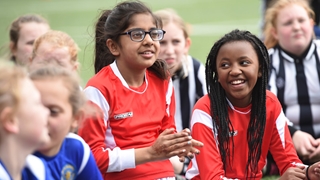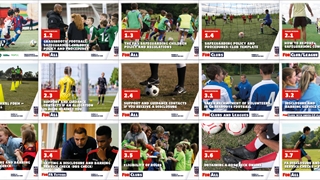
The facts
A child is someone who has not yet reached their 18th birthday. Once they turn 18, they are legally an adult.
- The FA, County Associations and football clubs should always ask parents/carers if it’s ok for their children to get involved in football activity.
- 16-17 year olds will usually be asked to make their own decision about getting involved (self-consent). In some exceptional circumstances parents/carers may also be asked.
Children have the right:
- To feel safe both online and offline;
- To healthy relationships and appropriate boundaries;
- Not to be bullied, harassed or intimidated;
- Not to feel uncomfortable or unsafe;
- Not to be discriminated against because of your age, gender, gender reassignment, ethnicity, sexual orientation, marital status or civil partnership, faith, ability or disability, pregnancy and maternity.
The UK signed the United Nations Convention on the Rights of the Child in 1990. The Convention sets out the rights of every child in the world to: survive, grow, participate and fulfil their potential. It sets standards for education, healthcare, social services and penal laws. It also establishes the right of children to have a say in decisions that affect them.
Involving children and young people in making decisions that affect them is important.
The FA has a National Youth Council which aims to provide a voice for all children and young people to influence change and develop a lasting legacy in football. You can find out more by visiting the The FA Youth Council Twitter account below:
View The FA Youth Council Twitter account
Most County Associations also have Youth Councils or Young Persons Forums. To find out more, contact your local County FA. Follow the link below for a list of all County FAs and their websites which contain key contact details.
Children and young people can be involved:
- By taking on the role of captain; with younger players sharing this responsibility game-by-game so everyone gets a chance;
- When deciding on the colour/style of new kit;
- By being invited by the coach/manager to give feedback on training sessions;
- Via a suggestions box;
- By having representation on the clubs committee or by sitting on a sub-committee that reports to the clubs main committee.
Also please read our Guidance Notes 6.3: Staying Safe in the Digital World at the foot of this page.
Organisations who support children include:
- CEOP Safety Centre (for support with online abuse) - https://www.ceop.police.uk/safety-centre
- Childline - https://www.childline.org.uk/ (Helpline: 0800 1111)
- ChildNet - http://www.childnet.com/young-people/secondary
- DisrespectNoBody - https://www.disrespectnobody.co.uk/
- NSPCC - https://www.nspcc.org.uk/what-you-can-do/report-abuse/ (Helpline: 0800 800 5000)
- Papyrus UK (suicide prevention support) - www.papyrus-uk.org
- Samaritans - https://www.samaritans.org/how-we-can-help-you (Helpline is open 24 hrs a day 116 123)
- Stonewall - http://www.stonewall.org.uk/help-advice
- Stonewall Youth - http://www.youngstonewall.org.uk/
- The Mix - https://www.themix.org.uk/
- YoungMinds - https://youngminds.org.uk/
How to get involved…








